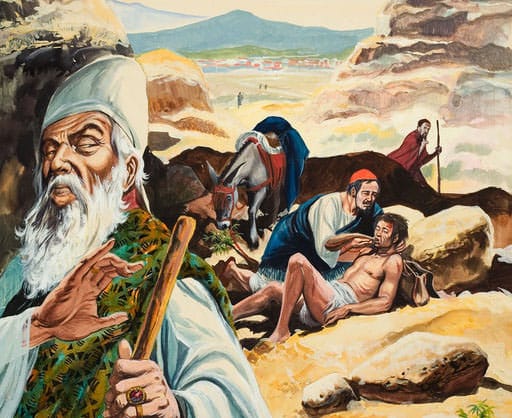
I am exploring Buddhist psychology’s Four foundations of mindfulness – looking into how to detect difficult emotions in the body as a felt-sense. In the grip of an emotion, I can learn to divert my attention to the felt-sense and away from reflecting on the emotion. Thinking about how upset I am, how bad the other person is, who caused it, or how can I lose this “bad” emotion – tends to intensify and prolong the feeling.
Studying embodied mindfulness, I am looking into how to be with my infinite to-do-list, and compassionately empathize with the difficulties and sufferings of others and helpful actions.
Princeton University conducted a Good Samaritan study, based on the Biblical parable. The subjects were seminarians, who were about to give a talk on this parable, would pass a man slumped in a doorway, moaning and coughing, on their way to the venue. Would they stop? The study found that if they felt they were late, they were less likely to help.
In the original parable, what motivated the priest and the Levite to pass by the injured man? Perhaps they were in a hurry and filled with important thoughts. Maybe the Samaritan, who helped the injured traveller was not? Or were the religious leaders filled with hypocrisy (unlike the Samaritan)? I consider myself moral, but if I saw that man by the roadside, what would I do?
Busily, we move through the world trying to get things done. At day’s end, when I look at my diary and I didn’t manage to do everything, is it possible not to be fearful? What happens if I move the unfinished items to the next day? Tara Brach, my teacher, relates a mother’s email to her son: “start worrying, details to follow”!
Challenged even as I write this, I notice my niece’s text “what are you up to?” a hint she wants to chat. My 11 y/old son asks whether we can work on something we need to do together. It is already late, my tendency would be to say “I am very busy, can it wait?”. This time, I paused, took a deep breath, checked-in with my body and the sensations in my chest. I felt a slight ache, a tenderness as I thought about these two dear beings who want my attention. What matters most? How do I want to feel at the end of my day, or the end of my life? More things checked-off for the satisfaction of accomplishment? Or sitting on that rocking chair, where the road ahead is way shorter than the road in the rearview mirror. How do I want to feel when I look back to this day? This pause prompted me to not brush aside my loved ones, just to get more done.
To be caring, to be kind, I have to pause and check-in with my body, this is the practice. During the day, we are pulled in all directions, attending to demanding tasks, to the responsibility to tend to the needs of others: the invitation is to take that sacred pause for just a breath, check-in with the body and inquire: what matters most?
“Do you pay regular visits to yourself?” – Poet Rumi
